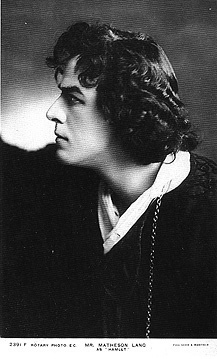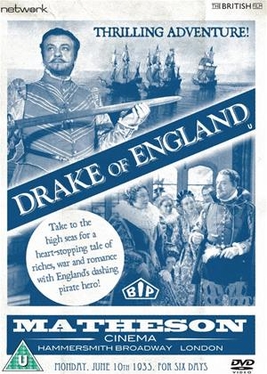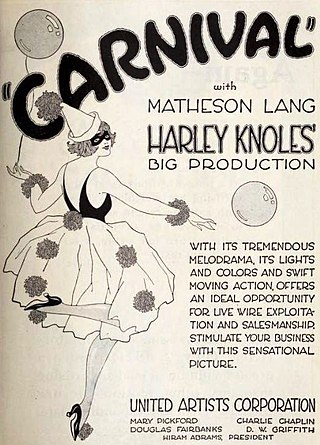Related Research Articles

The Merchant of Venice is a play by William Shakespeare, believed to have been written between 1596 and 1598. A merchant in Venice named Antonio defaults on a large loan on behalf of Bassanio, his dear friend, provided by a Jewish moneylender, Shylock.
George Matheson Murray, known publicly as George Murray, was a publisher and politician in British Columbia in the first half of the 20th century. He played a role in the founding of the Boy Scouts of Canada. Murray is best known as the husband of Margaret Lally "Ma" Murray.

Matheson Alexander Lang was a Canadian-born stage and film actor and playwright in the early 20th century. He is best remembered for his performances roles in Great Britain in Shakespeare plays.

Nelly Hutin Britton, usually credited as Hutin Britton was an English actress. She was best known for her performances in Shakespeare roles early in the 20th century. She also appeared in leading roles in two silent British films.

Drake of England is a 1935 British drama film directed by Arthur B. Woods and starring Matheson Lang, Athene Seyler and Jane Baxter. It depicts the life of Francis Drake and the events leading up to the defeat of the Armada in 1588.
The King's Highway is a 1927 British romantic adventure film directed by Sinclair Hill and starring James Carew, Gerald Ames, Matheson Lang and Joan Lockton. The film follows the romance and escapades of an eighteenth-century English highwaymen.
The Triumph of the Scarlet Pimpernel is a 1928 British silent costume drama film directed by T. Hayes Hunter and starring Matheson Lang, Juliette Compton and Nelson Keys. It was based on the 1922 novel The Triumph of the Scarlet Pimpernel by Baroness Emma Orczy. It was made at Cricklewood Studios, with art direction by Clifford Pember.
The Chinese Bungalow is a 1926 British silent drama film directed by Sinclair Hill, and starring Matheson Lang, Genevieve Townsend and Juliette Compton. It was based on the 1925 play The Chinese Bungalow, which was adapted for further films in 1930 and 1940. It was made by Stoll Pictures, whose principal star throughout the mid-1920s was Lang.

The Cardinal is a 1936 British historical drama film directed by Sinclair Hill and starring Matheson Lang, Eric Portman and June Duprez. The film depicts a power battle in sixteenth-century Rome between the leading church-statesman Giuliano de' Medici and one of his rivals. Other themes in the film are the Italian Wars against France and the construction of the new St. Peter's Basilica to a design by Michelangelo.
Mr. Wu is a 1919 British drama film directed by Maurice Elvey and starring Matheson Lang, Roy Royston, Lillah McCarthy and Meggie Albanesi. It was based on a 1913 play Mr. Wu by Maurice Vernon and Harold Owen. During the filming Albanesi became infatuated with Lang. The picture was made by Stoll Pictures, and was one of their first major successes. Lon Chaney played the title role in a 1927 remake. The screenplay concerns a Chinese Mandarin who murders his daughter.

Carnival is a 1921 British silent drama film directed by Harley Knoles and starring Matheson Lang, Ivor Novello and Hilda Bayley. During a production of William Shakespeare's Othello in Venice, an Italian actor suspects his wife of having an affair and plans to murder her on stage. It was based on a stage play of the year before, of which Matheson Lang was one of the writers. The film was a popular success, and was re-released the following year. In 1931, it was remade as a sound film, Carnival, directed by Herbert Wilcox.
The Ware Case is a 1917 British silent drama film directed by Walter West and starring Matheson Lang, Violet Hopson and Ivy Close. It is an adaptation of the play The Ware Case by George Pleydell Bancroft, filmed again in 1928 and in 1938.
The Secret Kingdom is a 1925 British silent fantasy and science fiction film directed by Sinclair Hill and starring Matheson Lang, Stella Arbenina and Eric Bransby Williams. It is an adaptation of the novel The Hidden Fire by Bertram Atkey. The screenplay concerns a wealthy man who acquires a mind-reading machine but is soon horrified to discover what people are really thinking. It was shot at Cricklewood Studios in London.
The Wandering Jew is a 1923 British silent fantasy film directed by Maurice Elvey and starring Matheson Lang, Hutin Britton and Malvina Longfellow. It was based on a play by E. Temple Thurston. It was remade in 1933 as The Wandering Jew.
The Qualified Adventurer is a 1925 British silent adventure film directed by Sinclair Hill and starring Matheson Lang, Genevieve Townsend and Fred Raynham. It was based on the 1922 novel The Qualified Adventurer by Selwyn Jepson.
The Blue Peter is a 1928 British silent adventure film directed by Arthur Rooke and starring Matheson Lang, Gladys Frazin, and Mary Dibley. The film was based on the 1925 play The Blue Peter by E. Temple Thurston.
Victory and Peace is a 1918 British silent war film directed by Herbert Brenon and starring Matheson Lang, Marie Lohr, and James Carew. The film was produced by the National War Aims Committee that was set up in 1917 to focus on domestic propaganda during the First World War. The novelist Hall Caine was recruited for the committee by the Prime Minister David Lloyd George to write the screenplay. Lloyd George chose Caine due to his experience in the field of cinema and his "reputation as a man of letters". The film was designed to show what would happen in a German invasion. It was mostly shot in Chester with some scenes filmed at Chirk Castle. Most of the negative of the newly finished film was destroyed in a fire at the offices of the London Film Company in June 1918. It was re-filmed over four months, just as the war ended, and so never went on general release. It is a partially lost film, with only around 1,000 feet of film still surviving. Edward Elgar was to have composed the score. Originally entitled The National Film, its alternative title is The Invasion of Britain.
White Slippers is a 1924 British silent adventure film directed by Sinclair Hill and starring Matheson Lang, Joan Lockton and Gordon Hopkirk. It was based on a novel by Charles Edholm. It is set in Mexico and is known by the alternative title The Port of Lost Souls.

Shylock is a fictional character in William Shakespeare's play The Merchant of Venice. A Venetian Jewish moneylender, Shylock is the play's principal antagonist. His defeat and conversion to Christianity form the climax of the story.
Anson Dyer, born Ernest J. Anson Dyer, was an English director, screenwriter, animator, and actor. His company Stratford Abbey Films, based in Stroud, was the only Technicolor production unit and three-colour camera in the whole Western Europe in the 1940s.
References
- ↑ Bamford, Kenton. Distorted Images: British National Identity and Film in the 1920s. I.B. Tauris, 1999. p. 55.
- ↑ Low, Rachael (2005). The History of British Film (Volume 3): The History of the British Film 1914 - 1918. Routledge. p. 295. doi:10.4324/9781315005713. ISBN 0415679885 – via Google Books.